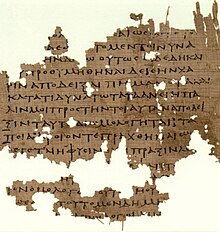Noble lie

In Plato's The Republic, a noble lie is a myth or a lie knowingly propagated by an elite to maintain social harmony.[1] Plato presented the noble lie (γενναῖον ψεῦδος, gennaion pseudos)[2] in the fictional tale known as the myth or parable of the metals in Book III. In it, Socrates provides the origin of the three social classes who compose the republic proposed by Plato. Socrates proposes and claims that if the people believed "this myth...[it] would have a good effect, making them more inclined to care for the state and one another."[3]
Criticism
[edit]The concept of the noble lie as defined by Plato has sparked controversy among modern interpreters. Although some earlier classical scholars including Francis Cornford argued that "noble lie" was a mistranslation, Allan Bloom argued for a literal translation and interpretation of Plato's expression.[4]
In The Open Society and Its Enemies, Karl Popper remarks, "It is hard to understand why those of Plato's commentators who praise him for fighting against the subversive conventionalism of the Sophists, and for establishing a spiritual naturalism ultimately based on religion, fail to censure him for making a convention, or rather an invention, the ultimate basis of religion." Religion for Plato is a noble lie, at least if we assume that Plato meant all of this sincerely, not cynically. Popper finds Plato's conception of religion to have been very influential in subsequent thought.[5]
See also
[edit]References
[edit]- ^ Brown, Eric (2017), "Plato's Ethics and Politics in The Republic", in Zalta, Edward N. (ed.), The Stanford Encyclopedia of Philosophy (Fall 2017 ed.), Metaphysics Research Lab, Stanford University, retrieved 2019-11-26
- ^ Translator Allan Bloom explains, "The word is generation which is, primarily, 'noble' in the sense of 'nobly born' or 'well bred'..." and refers to Plato's Republic 375a and 409c for comparison (p. 455 n. 65, The Republic of Plato, 2nd edition, New York: Basic Books, 1991).
- ^ Book 3, 415c–d
- ^ pp. xviii-xix, The Republic of Plato, 2nd edition, New York: Basic Books, 1991.
- ^ "Positive Liberty » Open Society VI: On Religion as a Noble Lie". Archived from the original on 2007-12-09. Retrieved 2019-01-15.
